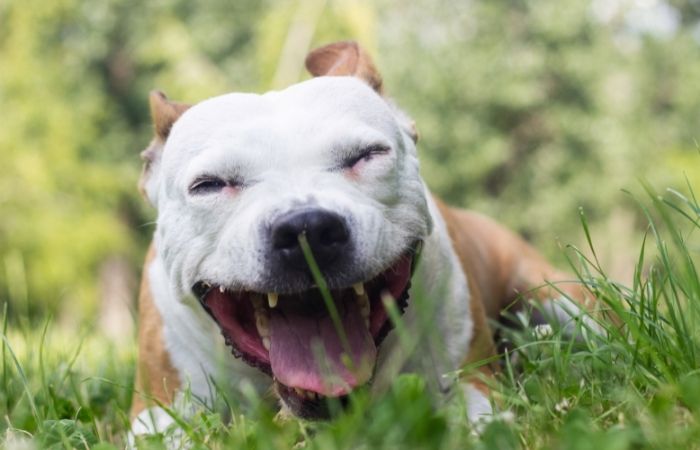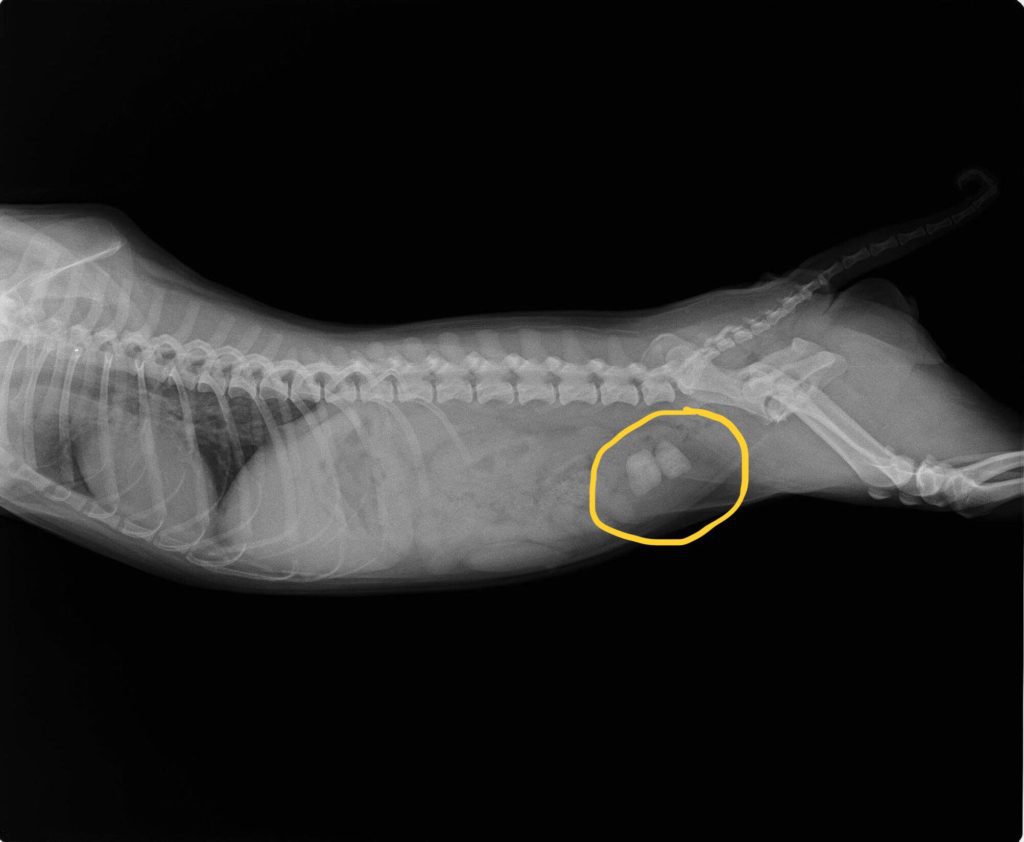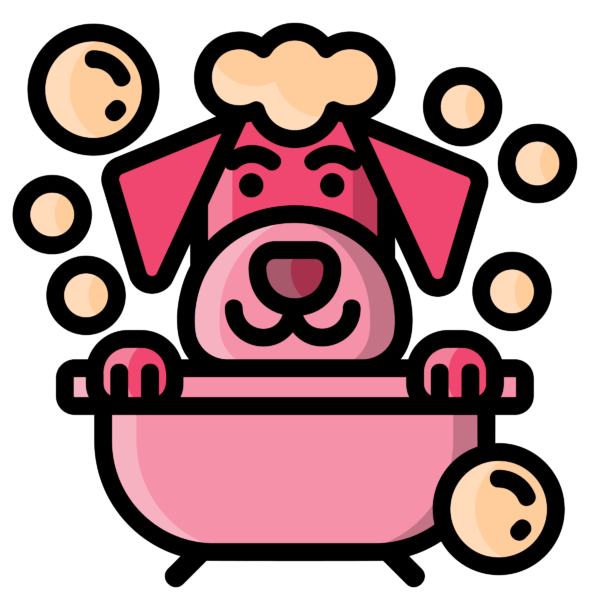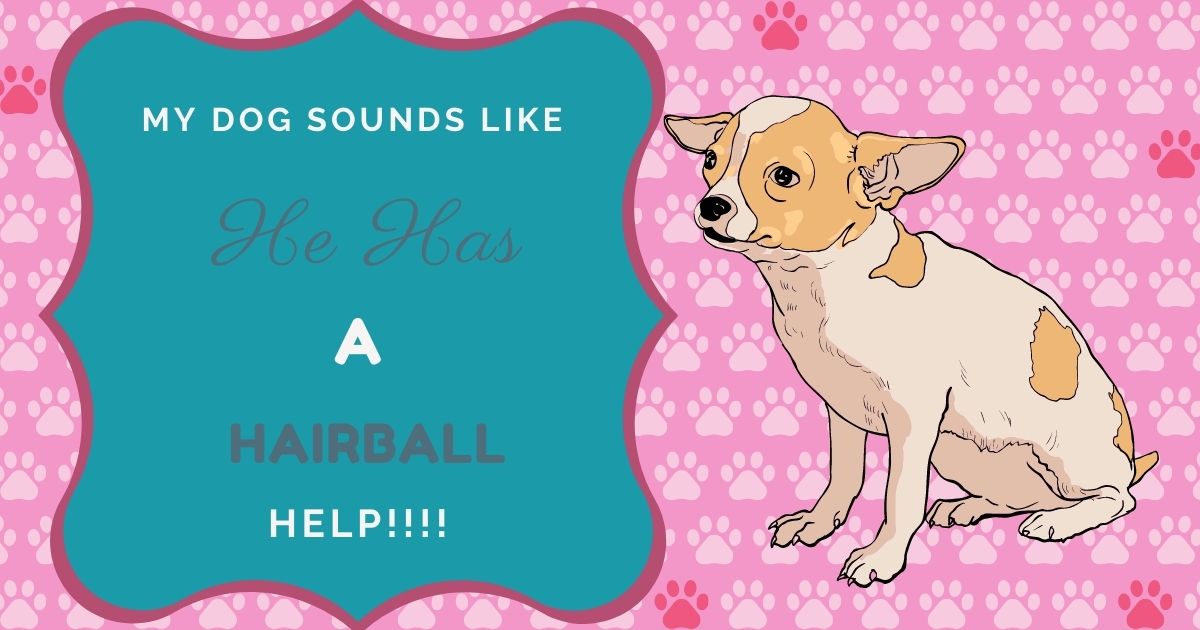You must be wondering, “my dog sounds like he has a hairball; what should I do?”
If your dog keeps gagging, we know how frustrating it can be. It’s not just the noise that bothers us, but also the fact that our dogs are in pain and discomfort. They bark, whine, and howl like no other animal on earth.

But what about when your pup starts making weird noises that sound like he has something stuck in his throat? You might be worried that it’s severe or even life-threatening. However, there are many reasons why dogs make these types of sounds, and not all of them are bad news for your pet.
Let us help you understand some common causes behind dog coughing and gagging so that you can relax again. We want to keep your furry friends healthy and happy.
Why is my Dog Doing This?
So why is your dog coughing and gagging? And could it be something serious?
If your dog makes a “gurgling” type sound, this means that he is trying to get something out of his throat or clear an irritation from his airway.
It is a natural and repetitive behavior that sends an automatic message: “I must do something with my mouth to feel better!” It’s like when you say in a high voice, “I need to clear my throat.”
Dogs who make this gurgling noise usually have a buildup of hair or fluid or might have a problem with their teeth.
Why is My Dog Sound Like He Has a Hairball?
There are several reasons why your dog might be making these sounds. Some of the most common causes include:
Hairballs (Fuzz, Thread, etc.) Caught in Their Throat or Airway
When your dog eats fur, fuzz, or thread, it can get stuck in its throat. This is especially common with long-haired dog breeds. These objects can also be coughed up as a hairball and cause some loud gagging sounds.
Infections (Tonsillitis)
Some infections such as tonsilitis can cause dog gagging and coughing due to inflammation in the throat. This is most common with short-haired dogs because there is less hair for them to swallow.
Reverse Sneezing
Reverse sneezing is the rapid inhalation of air through the nose followed by a series of sharp, repetitive sniffs or barks. This can sometimes sound like gagging and coughing because it causes an object to vibrate in the throat.
Because this happens so rapidly, your dog may appear to be choking for a moment until they get everything under control.
Tracheal or Laryngeal Collapse
Certain breeds of dogs are more susceptible to laryngeal collapse—when the windpipe becomes pinched by the surrounding throat tissue and collapses partially. As a result, the dog may make gagging noises due to its struggle to breathe. This is typically more common in smaller breeds like Pomeranians and Yorkies.
Congenital Defects (Megaesophagus)
Some dogs are born with an incomplete muscle at the base of their throat, making it difficult to swallow. This is called megaesophagus and what ensues is a series of powerful gagging or coughing sounds as they attempt to clear their airway. Sometimes saliva will pool around the base of their tongue and cause them to drool excessively.
Chronic Bronchitis
Chronic bronchitis in dogs causes a dry, hacking cough that becomes worse with activity and enthusiasm. The illness is caused by chronic inflammation of the airways, which narrows passageways for breathability resulting in shortness of breath due to thick mucus production from within their respiratory system.
Obesity
Being overweight can make it harder for your dog to breathe and swallow properly. If they struggle to do either, then it may cause gagging or coughing sounds.
Kennel Cough
Also known as bordetella in dogs, kennel cough in dogs is an upper respiratory infection that usually affects kenneled dogs (i.e., those who go to the groomer or dog park). This illness can sometimes make it difficult for your dog to swallow and cause gagging sounds.
Bladder Infection (cystitis)
Bladder infections cause inflammation and irritation that can make it difficult for your dog to control their bladder sphincter- this is called urinary incontinence. This can cause a fair amount of pain which may prompt you to notice gagging sounds as your dog struggles with the pain.

Dental Disease
Nasty tartar buildup on your dog’s teeth can sometimes cause dog gagging or coughing because the plaque irritates their throat.
Hemorrhagic Gastroenteritis
This is a condition that causes severe vomiting and diarrhea. It’s most common in puppies, but it can affect any dog breed or age. In the initial stages of the disease, your dog may gag on saliva due to vomiting.
What are the Causes of Hairballs in Dogs?
There are many causes of hairballs in dogs, but the most common one is when your dog swallows too much hair during self-grooming. When your pet licks his body clean, he might ingest some of the furs that are on his skin or that fall to the floor.
Grooming can be a very relaxing activity for your dog, but your pup might accidentally eat some of his furs. Your pet could also try to eat the fur around his paws or clean himself with his paws as cats do, which can cause him to ingest more than usual. Another reason is when dogs swallow too much hair during playtime.
Are Hairballs Dangerous for my Dog?
Hairballs are a common problem for dogs, but they can be dangerous if not dealt with quickly. If your pup starts vomiting or has trouble breathing after consuming hair or fur from its mealtime, scrapes off on the ground into their stomach contents, then it’s time to take them to the vet.
Hairball issues often lead to dehydration because these sharp little balls block out essential fluids that would otherwise flow through fully without obstruction.
Pups also have an increased risk of getting septicemia due to just one single clogged-up hairball being stuck inside their esophagus. In addition, as the pup’s body fights the hairball, it creates a lot of dangerous toxins that can sometimes wind up poisoning them.
What Should I Do If My Dog Has Hairballs?
The best way to deal with a stubborn hairball is to combine cat hairball treatment medication with petroleum jelly in a ratio of 1:2. Mix this and let it sit in a fridge to solidify, then feed it to your pup. This will unclog the hairballs so they can pass through their digestive tract in small portions.
If your dog tries to vomit and nothing comes out, try massaging his throat to get the hairball moving down towards the stomach. You can also give him water or milk via a syringe to help wash the hairball down.
If nothing happens and you suspect your dog has a blockage, contact the vet immediately.
The Prevention of Hairballs in Canines
If you think your furry friend might have developed a hairball, here are some ways to prevent this from happening:
- Feed high-quality food – Ensure the first ingredient in your dog’s food is meat, not corn or other fillers.
- Feed the right amount of food – Don’t overfeed your dog, and don’t underfeed him either. When you measure your dog’s food, a good rule of thumb to go by is 2 1/2 cups for every 50 pounds he weighs.
- Brush your dog – Frequent brushing can help cut down on the amount of hair that gets ingested.
- Clean Up After Your Dog – Groom Them Regularly -You should also clean up after your pooch when they go in the yard, especially if they’re not neutered or spayed. This will help prevent them from eating their feces and other dogs’ feces, containing a lot of hair.
- Treat Fleas And Ticks -If your dog has had a history of getting fleas, you may want to consider using a more robust flea treatment. Be careful not to choose one that is too harsh on your pup’s skin, though.
- Treat Allergies And Skin Problems -Your dog could also be dealing with allergies or some other type of skin condition that causes him to scratch compulsively. If you know that your dog is dealing with allergies, you can use a natural treatment or even allergy medicine to help him feel better.
- Keep Your Dog Calmer -Your pup might start hacking because he’s too excited or hasn’t received enough exercise throughout the day. If this is the case, make sure you do something to calm your pup down.
- Provide A Place To Rest And Relax – If your dog stays home alone for too long during the day, he might be working on getting rid of his excess energy by grooming himself. You can prevent this from happening by giving him a place in his kennel where he can relax and feel safe.
When to be Concerned About Your Dog Gagging
Dog coughing and gagging is normal behavior when playing around or eating something that doesn’t agree with their stomach. However, if your dog is gagging and nothing is coming out, it could be dangerous.
If your dog is showing any of the following signs, you should contact a vet immediately:
- Coughing up blood
- Not eating or drinking water
- Stops breathing for extended periods
- Vomiting and nothing, or very little food comes out
- Seizures
What is Kennel Cough, and What Are the Symptoms?
Kennel cough in dogs (canine infectious tracheobronchitis) is a highly contagious respiratory disease in dogs. This disease is caused by a bacteria known as Bordetella (Pasteurella), which excites the cells within the throat and windpipe to release fluid.
This can make it extremely difficult for infected dogs to breathe in air, cough, gag, and snore, often making them sound like they have an obstructed airway.
Symptoms include:
- Dry hacking cough
- Whooping sound on inhaling
- Coughing up mucus, usually clear in color
- Increased breathing rate
- Sneezing
- Runny nose (generally clear in color)
- Watery eyes
- Fever
- Loss of appetite
What Does Kennel Cough Sound Like?
The following are the five most frequent kennel cough noises in dogs:
- Honking: The honking noise makes a sound similar to a goose/rooster. It is a sound of forced air through the trachea, and it is rare.
- Tracheal Coughs: The tracheal cough is also known as the “HUFF” or huffy sound. It is a sound produced by irritated tracheal tissues. It is the most common kennel cough noise, and it sounds like snoring or wheezing.
- Gagging: The gagging sound is produced by air forced through the esophagus and trachea. It sounds like retching.
- Deep Cough: The deep cough is the sound of air forced through the larynx and trachea. It sounds like a bark or choking noise.
- Wet Cough: The wet cough is the sound of fluid caught in the trachea. It sounds like a honking noise or someone trying to clear their throat.
- Hacking (dry dog cough): The hacking sound is produced by air forced through the throat. It is a common symptom of kennel cough, and it sounds like barking coughs or retching.
How Do Dogs Get Kennel Coughs?
For the most part, dogs get kennel cough from other sick dogs. If your pup is in a shelter or boarding facility with many other dogs, he will be more likely to get sick. With this being said, healthy dogs can also catch kennel cough. A type of coronavirus causes kennel cough, and the virus lives in the back of the throat and nasal passages.
The most common incidence of an outbreak happens with dogs at boarding facilities, shows, and shelters. Dogs that are exposed to large groups of other dogs are typically more likely to catch kennel cough. Dogs do not carry the virus around in their systems but contract it from other sick animals.
How Long Does Kennel Cough Last?
Most cases of kennel cough will last between seven to ten days. In rare cases, the infection may continue to plague your pet for several weeks. If your pup contracts kennel cough from a recent vaccination, they may experience a chronic infection of a longer duration. This type of situation can also occur if there are underlying health conditions present, such as a heart murmur.
How Can I Tell if My Dog Has Kennel Cough?
If you are not familiar with the sound of an infected canine, then it is difficult to say for sure that your pup has a kennel cough upon first listen. However, if your pet does present with these symptoms, it is essential to bring them to a veterinarian. The vet will be able to tell if your dog has kennel cough upon visual inspection of the mucus and cells from their throat and trachea.
Kennel Cough Treatment
Since most cases of kennel cough in dogs last for only a few days, treatment is not typically required. This disease tends to resolve itself faster than most other canine infections due to your pet’s immune system’s strength and quick response time.
The Kennel cough vaccine is critical as it can prevent your pup from contracting this potentially dangerous infection in the future.
While vaccination does not cure your dog, it will help instigate the production of antibodies to fight this illness. The vaccine for kennel cough is crucial as your pup could contract a severe case of this disease without it and perhaps even be subjected to death.
It is recommended that you have your canine vaccinated for this disease at least 14 days before boarding them in a kennel or spending time with other dogs. If you plan to take your pet with you when you travel in a car, ask your vet if it is safe to do so. If the answer is no, it is a good idea to have your pet vaccinated in the weeks leading up to the trip.
If you decide to treat your dog, the most effective treatment for kennel cough in dogs is to purchase some antibiotics from your local pet store or vet clinic. Antibiotics for kennel cough will help knock out this infection much faster than nature alone.
This will make it easier for your pup to breathe and assist them in recovering faster. Just be sure not to give your dog any antibiotics without consulting with your veterinarian first, as they will not be able to determine whether or not the infection is viral or bacterial.
Several home remedies for kennel cough can help speed up recovery, including garlic, raw honey, colloidal silver, and apple cider vinegar.
Are Some Dogs More Prone to Hairballs Than Others?
Yes, some dogs are more prone to developing hairballs than others. It can even depend on their coat type or how often they are groomed. For example, it’s much more common for long-haired dogs to have these issues than short-haired ones.
You might notice that your dog swallows a lot of their hair when they are in the middle of grooming. Dogs with longer, thicker coats will typically swallow more hair than dogs with short, thin coats.
It can also depend on your dog’s activity level. For example, if you take your dog out for long walks and they constantly run around, it’s much more likely for them to swallow a lot of their hair. On the other hand, if your dog spends most of the day sleeping or laying around, they are less likely to eat their hair.
The Tail End of the Story
If your dog sounds like he’s got a hairball, you should take him to the vet immediately. Hairballs are not only unpleasant, but they can lead to more severe conditions. There are many possible causes. The only way to find out for sure is by seeing a vet.
However, if you notice any other symptoms and this hairball noise, such as vomiting or diarrhea after eating, it could be more severe and will require immediate medical attention.
In general, dogs will make these sounds when they have an obstruction that needs to be cleared from their throat or esophagus, which can happen due to swallowing too much fabric while chewing on things like blankets or pillows. Consult with your veterinarian about treatment options.


2 thoughts on “My Dog SOUNDS Like He Has a Hairball! Help!”
Comments are closed.